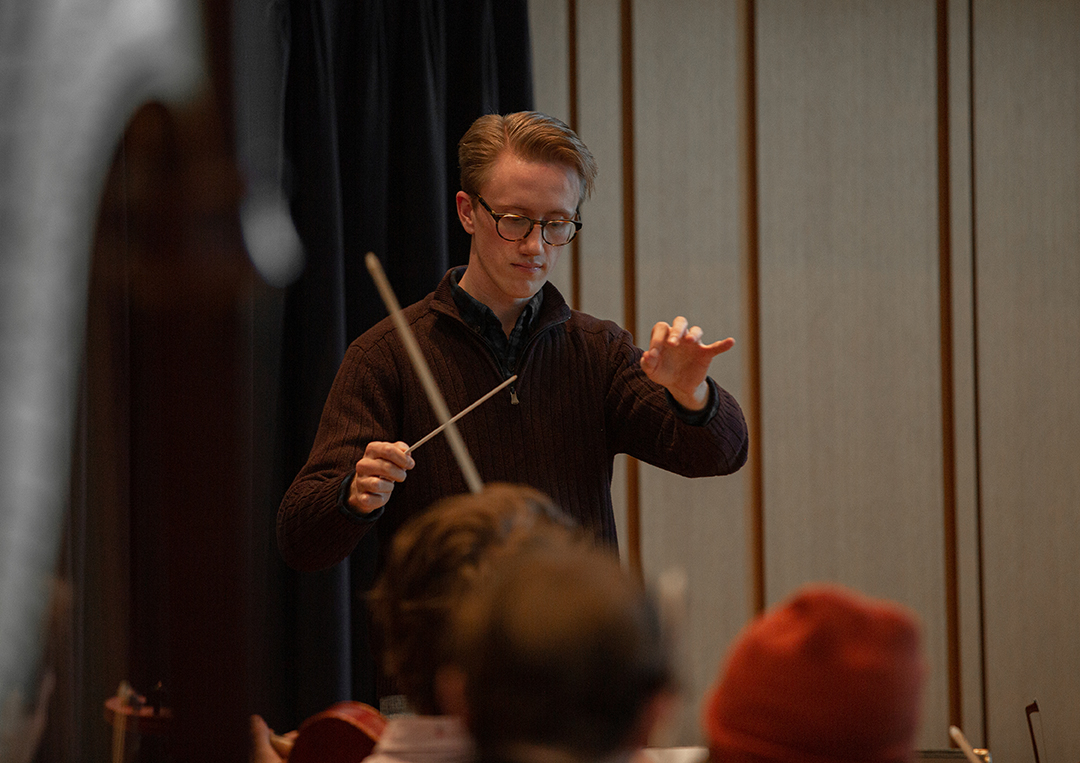Samuel Hollister, on conducting the Yale Philharmonia
On Feb. 24, the Yale Philharmonia will perform its annual concert in the School’s intimate concert venue, Morse Recital Hall in Sprague Memorial Hall. Conducting student Samuel Hollister ’18BA ’28DMA will lead the orchestra in a program that includes Ravel’s Le Tombeau de Couperin, Mozart’s Piano Concerto No. 25 in C major, K. 503, with soloist Derek Wang ’24AD, and Atterberg’s Eighth Symphony. We spoke with Samuel, who serves as Director of Orchestral Activities at the University of Rhode Island, about the repertoire he and the Yale Philharmonia will perform, the conducting program at YSM, and the professional aspirations that drive him.
Q: Why did you choose to program the Atterberg symphony and the other works on the program?
Sibelius has always been one of my favorite composers, and through that connection I developed a love of Finnish and, generally, Scandinavian symphonic music from a young age. Part of my family is from Sweden, so I quickly noted the remarkable infrequency with which Swedish music gets performed. For the last few years, I have dug deep into the symphonic tradition of Sweden, and I've been thrilled to find an almost endless array of incredible compositions by unsung composers. Within moments of listening to Atterberg's Second Symphony, I was completely in love with his symphonic language. His style fuses the harmonic color of Mahler and Wagner with the formal and contrapuntal style of Brahms and the grandiose Scandinavian landscape-inspired sounds of Sibelius. But the thing I love most about Atterberg is that every measure of music is incredibly compelling; it doesn't take analysis, research, or an incredible stamina to be able to understand and appreciate Atterberg's music, let alone to get goosebumps at every turn.
The Eighth Symphony is particularly compelling in its treatment of Swedish folk song. Each theme from each movement is taken from a traditional Swedish folk tune, and in creating this Eighth Symphony, Atterberg sought to honor and explore the wonderfully rich folk traditions of Scandinavia by intertwining and absorbing these themes into the modernist symphonic tradition, much as Dvořák did with his folk- and vernacular-inspired Ninth Symphony in the United States. The result is a work with the grandeur, sweep, character, and passion of the “New World” Symphony, but giving us instead a glimpse into the unique and beautiful folk culture of Sweden.
What particularly excites me about this program is the opportunity to perform orchestral music in Sprague Hall rather than Woolsey Hall. The smaller, more intimate space affords us the chance to explore the charming details of orchestration such as those found in Ravel's Tombeau de Couperin, which will open the performance. Originally written for piano, Ravel orchestrated the suite himself, infusing it with his signature orchestrational style: elegant virtuosity across all instrument families. In many ways, in fact, this suite is a concerto for woodwinds, in particular oboe. The size and acoustics of Sprague will allow the many woodwind solos, string harmonics, and delicate harp textures to come through clearly and warmly without needing to press.
Q: What brought you to YSM and how has the conducting program here prepared you for a career on the podium?
The conducting program at YSM is an unparalleled chance to gain experience in a very real-world way: the conducting student is essentially an assistant conductor. For each orchestral cycle, I have the responsibility of preparing the Yale Philharmonia in its first week of rehearsals, and in the performance weeks I assist Principal Conductor Peter Oundjian and the various guest conductors who come to perform. Given the focused podium time, the one-person studio, and the real-world expectations, the opportunity is just in a different category from normal conducting degrees. For the academic portion of the degree, I am pursuing a doctorate, so it goes without saying that coming to Yale for an opportunity like this means that academic opportunities and support are equally rich and extensive.
Q: What are your professional aspirations and where do you see yourself in five years?
I aspire to conduct both professional and educational groups. Currently, I am on the faculty of the University of Rhode Island as the director of the orchestral program, and it's an experience that has fully reaffirmed and reinvigorated my long-felt love of teaching and working with young musicians. In five years, though, I would like to be moving closer toward my goals with professional orchestras; I would love to be working as an assistant conductor, or perhaps music director, for an exciting ensemble and working on ways to expand our programming horizons to include some of the music that I am most passionate about: music by living composers and music from Sweden and Scandinavia at large. It's no exaggeration, in fact, that I hope to truly champion the music of Kurt Atterberg, Wilhelm Peterson-Berger, Elfrida Andrée, and many of the other incredible late Romantic and early modern symphonists from Sweden. And if, by five years from now, I have continued to help create that excitement and verve, I will be very happy!
Conducting student Samuel Hollister will lead the Yale Philharmonia on Friday, Feb. 24, at 7:30 p.m., in Morse Recital Hall in Sprague Memorial Hall. Learn more about the concert here and more about Samuel Hollister here.






